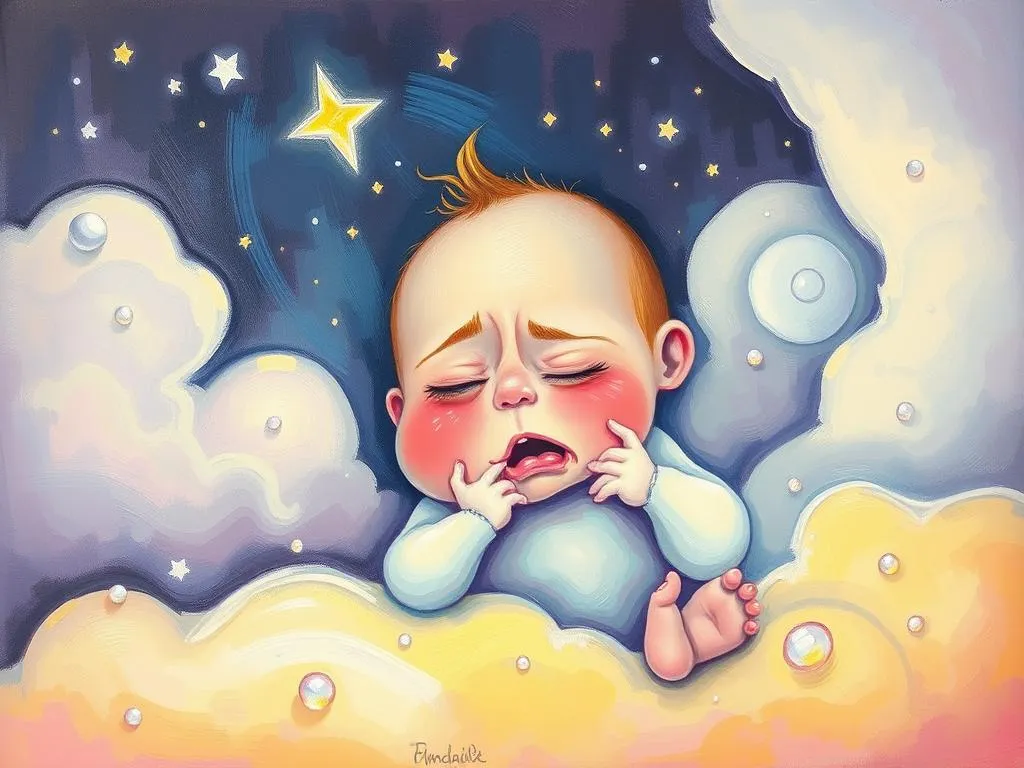
Dreams have long fascinated human beings, serving as a window into our subconscious. Among the myriad of dream scenarios, the image of a crying baby holds particular significance. This dream can evoke a range of emotions and interpretations, making it a topic that intrigues many. Whether it conjures feelings of anxiety, concern, or a deep sense of empathy, understanding the symbolism behind a crying baby in dreams can unlock profound insights into our waking lives and emotional states.
Symbolism and Meaning
The crying baby is a powerful symbol in the realm of dream interpretation. At its core, a crying baby often represents vulnerability, innocence, and unmet needs. Babies, being dependent on their caregivers, can symbolize aspects of ourselves that require attention or care. When you dream of a crying baby, it might reflect feelings of helplessness or a desire for nurturing—either for yourself or others.
From a psychological perspective, the crying baby can also embody unresolved emotions. It may signify feelings that you have not fully processed, such as grief, fear, or anxiety. These emotions may be manifesting in your dreams as a plea for attention, urging you to confront what you may be neglecting in your waking life.
Additionally, the context in which the baby is crying can shift the meaning significantly. For instance, if the baby is crying in a comforting environment, it may signify a need for security and reassurance. Conversely, a crying baby in a chaotic or frightening setting could indicate overwhelming stress or anxiety in your life.
In a more positive light, a crying baby might also symbolize new beginnings or creativity. Birth often represents the start of something new, and the crying can be viewed as the initial struggle that precedes growth and transformation. This duality of meaning—both as a symbol of distress and of potential—adds depth to the interpretation of this dream scenario.
Key Scenarios and Variations
The context of the crying baby in your dream can lead to various interpretations, emphasizing the importance of the specific scenario. For example, if you dream of a crying baby that you are trying to soothe, this could reflect your desire to take control of a situation in your life that feels chaotic or overwhelming. It may indicate that you are stepping into a nurturing role, either for yourself or for someone else in need of support.
In contrast, dreaming of a crying baby that you cannot comfort may highlight feelings of inadequacy or helplessness. This scenario can evoke a sense of frustration, suggesting that there are aspects of your life where you feel powerless to effect change. It may also symbolize the fear of not being able to meet the expectations of others or yourself.
Another variation involves the presence of multiple crying babies. This could indicate an overwhelming situation in your life, where you feel that numerous responsibilities or emotional burdens are crying out for your attention. It may represent the chaos of daily life, reflecting the demands placed upon you and your fear of not being able to manage them all.
Additionally, dreaming of a crying baby in a public setting, such as a crowded room, might suggest feelings of vulnerability in social situations. It could represent your fear of exposure or judgment from others, amplifying the sense of insecurity already present in your waking life.
Conversely, if the dream involves a crying baby that eventually stops crying, it could symbolize resolution and the ability to overcome emotional challenges. It suggests that you are moving towards a place of understanding and acceptance, allowing you to find peace amidst turmoil.
Real-Life Connections and Takeaways
Understanding the meaning behind your dreams involving a crying baby can provide valuable insights into your emotional state and life circumstances. Reflecting on these dreams can help you identify areas in your life that require attention and care, whether they are related to personal relationships, work stress, or inner emotional conflicts.
To connect these dreams to your real-life situations, start by considering the emotions you felt during the dream. Were you anxious, nurturing, overwhelmed, or relieved? These feelings can guide you toward understanding the underlying issues that may need addressing in your waking life. Ask yourself if there are aspects of your life that are currently feeling neglected or if there are emotions you have been avoiding.
Practical advice for self-reflection includes journaling about your dreams and the feelings they evoke. Note the specific details of the dream, such as the setting, your actions, and your emotional responses. This process can help you uncover patterns or recurring themes that might point to unresolved issues or areas of growth.
Additionally, consider whether there are relationships in your life that require greater attention or nurturing. Just as a crying baby demands care, your dreams may be signaling a need to invest time and energy into connections that are important to you. This could involve reaching out to friends or family members, or it might mean taking time for self-care and emotional healing.
Moreover, if the dream evokes feelings of inadequacy or stress, it may be beneficial to explore stress-relief techniques. Mindfulness practices, such as meditation or deep breathing exercises, can help you manage anxiety and cultivate a sense of calm. Engaging in creative activities may also serve as a therapeutic outlet, allowing you to channel your emotions constructively.
Ultimately, the dream of a crying baby serves as a reminder of the importance of nurturing ourselves and those around us. Embracing vulnerability and acknowledging our emotional needs can lead to personal growth and stronger connections with others. By paying attention to the messages within your dreams, you can gain deeper insights into your emotional landscape and make meaningful changes in your life.
In conclusion, the symbolism of a crying baby in dreams is rich and multifaceted. It invites us to explore our vulnerabilities, recognize unmet needs, and confront unresolved emotions. The variations in scenarios further enrich the interpretations, allowing for a more personalized understanding of what the dream may signify. By engaging in self-reflection and considering the connections between dreams and waking life, we can use these insights as a tool for personal growth and emotional well-being. As you reflect on your dreams, remember to be gentle with yourself and embrace the journey of understanding your inner world.







